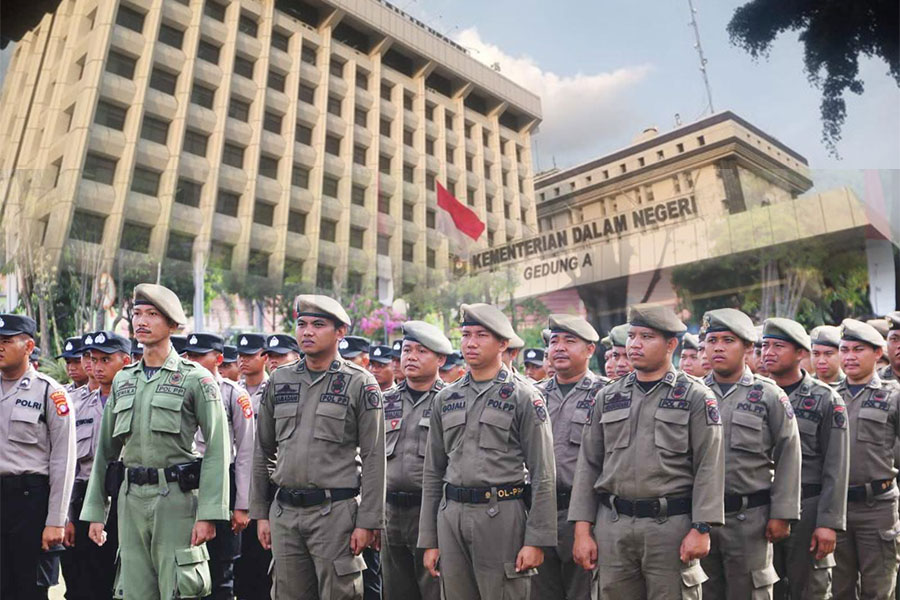Modernization Strategy: Governance of Internal Affairs Management, Ministry of Home Affairs & Regional Governments

The modernization of governance in internal state management can no longer be understood merely as a technocratic agenda based on formal regulations and administrative policies.
It must also be seen as a historical process that moves in tandem with societal dynamics, social change, and the evolving relationship between the state and its citizens—changes that may give rise to social unrest.
In this context, one of the most tangible areas of testing is the administration of public order, community security, and civil protection (Trantibum Linmas).
This area is often treated as a technical matter, surfacing only when social disturbances or open conflicts occur – when in fact, within Indonesia’s constitutional framework, it is a mandatory governmental function directly tied to basic public services.
This position underscores that Trantibum Linmas cannot be regarded as a routine bureaucratic function, but as an existential foundation of the Ministry of Home Affairs – vital to upholding the order of society and the state.
Similarly, Law No. 23 of 2014 on Regional Government explicitly designates Trantibum Linmas as a mandatory function of local government.
This means that every regional head cannot ignore the duty of maintaining order and protecting the community, as it is the clearest expression of basic public service.
Government Regulation No. 16 of 2018 further reinforced the role of the Civil Service Police
Unit (Satpol PP) as a regional apparatus with three core mandates: Enforcing regional regulations and decrees of regional heads, Maintaining public order, Providing protection to the community.
Philosophically, this mandate carries the meaning that local governments are not only given administrative authority, but also a moral responsibility to create social spaces that are orderly, safe, and protective of citizens’ right to life.
It is here that positive law meets political ethics: local governance cannot stop at rule-making, but must extend into the realm of human service.
At the same time, police reform – which directs the National Police (Polri) to focus more on criminal law enforcement, transnational crime, and national security—has reshaped the institutional constellation of the state.
Through this division of tasks, it becomes clear that the state is building a more systematic security management model: Polri acts in the realm of criminal law and strategic security, while Satpol PP operates at the local level, ensuring the daily life of citizens unfolds in order and safety.
Yet this division is not simple. It requires synergy, since in reality, issues of public order often overlap with criminal acts.
A demonstration that begins as a minor public order disturbance can escalate into a criminal act; a land dispute rooted in administrative violations can evolve into horizontal conflict threatening national security.
Thus, coordination between Satpol PP and Polri is not complementary but an absolute requirement for the functioning of the state.
Looking deeper, the greatest challenge in modernizing internal governance management lies in fragmented authority, limited capacity, and weak coordination mechanisms.
Satpol PP is under the control of regional heads, while Polri reports directly to the President through the National Police Chief.
These different chains of command often lead to lack of synchronization in field operations.
Within the modernization framework, a systemic strategy is required.
Modernization is not simply about updating equipment or tightening regulations, but about building a new paradigm for Trantibum Linmas.
The first priority is strengthening the capacity of Satpol PP and Linmas.
They must no longer be treated merely as street enforcers but positioned as professionals skilled in conflict management, social communication, and solid legal understanding.
Competency-based education and training must be expanded, not only in field techniques but also in information technology, persuasive approaches, and crisis management.
The professionalization of Satpol PP is both a philosophical and pragmatic step: without it, building a modern regional government is impossible.
Modernization cannot be separated from digitalization.
In this era of the Fourth Industrial Revolution and the information society, maintaining order and protecting communities must also be supported by technology.
Information systems for Trantibum Linmas that enable early detection of potential disturbances must be developed in every region.
Data from Satpol PP should be integrated with Polri, disaster management agencies (BPBD), and other relevant institutions through a command center capable of rapidly responding to signs of disruption.
Online applications enabling citizens to report violations of regional regulations or potential conflicts are also innovations that must be seriously developed.
In this way, citizens become not only objects of protection but active subjects in maintaining order.
Modernization, in this sense, means broadening citizen participation while accelerating government responsiveness.
Yet technology and capacity will mean little without strong coordination.
Synergy between Satpol PP and Polri must transcend structural boundaries.
A permanent coordination forum, facilitated by the Ministry of Home Affairs, is needed to align visions between the central government, local governments, and the police.
Joint field operations must be carried out routinely, particularly in response to issues with the potential to spark wider social unrest.
Prof. Dr. Ermaya Suradinata, SH, MH, MS, was Governor of Indonesia’s National Resilience Institute (2001–2005) and Director General of Politics and Social Affairs, Ministry of Home Affairs (1998–2000). He is an Expert Council Member of BPIP (Agency for Pancasila Ideology Education) in the field of Geopolitics and Governance, and Chairman of the Advisory Board of the Center for Geopolitics & Geostrategy Studies Indonesia (CGSI).
